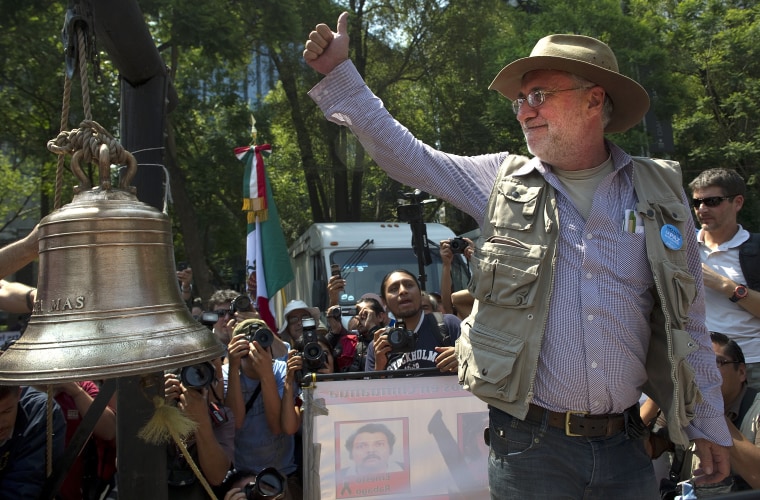Very few fugitives have captured America’s imagination like the drug lord Joaquín “El Chapo” Guzmán. His elaborate tunnels to move drugs from Mexico to the United States and his larger-than-life escapes from maximum-security prison made him a legend. But news of his third capture on Friday—and the kingpin’s shocking secret meeting with Oscar-winning actor Sean Penn months earlier—has surprised the families of drug war victims in Mexico who struggle to get media attention for their dead or missing.
“The face of El Chapo is a smokescreen. Behind the kingpin’s image, which is magnified by the media and the politics of Mexico and the United States, is the hidden truth… of the dead and those who are still disappearing,” said the acclaimed Mexican author and poet Javier Sicilia in a phone interview with NBC News. His 24-year-old son Juan Francisco - a young man who Sicilia said had not even tried drugs and had an athletic scholarship in college - was tortured and murdered with six other victims by drug gang members in 2011. And now, the Mexican writer is the leader of a movement that rallies thousands of supporters against the drug war, which they argue has escalated violence and destroyed many innocent families.

Penn’s recent Rolling Stone article about his secret meeting with the world’s most wanted man describes El Chapo’s rags-to-riches story—a peasant farm boy who worked his way from marijuana and poppy fields to building the largest drug trafficking empire in history, shipping “more than half of all the cocaine, heroin, methamphetamine and marijuana that come into the United States.” And while Penn tries to humanize the cartel leader as a “Robin Hood” who has given back to his community by building roads, and providing food and medical relief, critics say the article crosses the line between journalism and entertainment because it sensationalizes the Mexican cartel leader’s story.
RELATED: Film 'El Poeta': Mexico's Drug Wars' Toll on Innocent Families
Alfredo Corchado, the award-winning Mexico City bureau chief for The Dallas Morning News, described the Hollywood actor’s interview with El Chapo on Twitter as an “epic insult to journalists who died in the name of the truth.” Corchado told the Washington Post that by submitting the article for El Chapo’s approval before publication, Penn created a conflict of interest by not challenging what is being said in the interview.
Similarly, Sicilia points out that by focusing on El Chapo and the drug cartels, many journalists and the governments of Mexico and the United States become complicit in telling only one side of the drug war story. “While they [the Mexican authorities] were out capturing El Chapo, in Morelos [Mexico] where I live, a mayor was getting murdered,” said the Mexican writer. “El Chapo is a symbol [of the drug war] that governments use to award themselves a victory against the drug cartels and organized crime… [but] reality is different… People are still dying. People are still disappearing. People are still living in fear...”
RELATED: Mexico Formally Begins Extraditing El Chapo
Sicilia also explained that the drug war has changed the way we see immigrants and marginalized communities in the United States. “By treating drugs as a national security issue instead of a public health issue… African Americans have been criminalized,” he said referring to mandatory minimum sentences for drug offenses, which have convicted more African Americans than any other group. “And Mexican and Central American immigrants have become the faces of possible criminals.”
In response to Penn and Kate del Castillo - the Mexican actress who is credited with brokering the secret meeting with El Chapo - Sicilia urges both actors to use their influence to tell the stories of the victims. “[Penn] has a good reputation as a defender of noble causes… and Kate del Castillo—who accompanied us in Los Angeles when we did our march for peace—have the capacity to interview many people,” he said. “And while governments and the media continue to use abstract numbers to talk about [the drug war] victims, it will be difficult to move and touch the hearts of others.”
The Mexican author emphasizes that only when the names of those who were killed are known, when the stories of their suffering are heard, and multiplied by the thousands, people everywhere will call out to end the war.